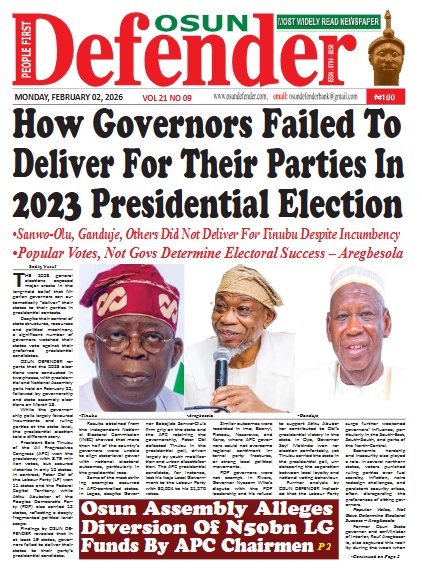US Court Authorises Chinese Investors To Seize Nigeria’s Assets Abroad

An appellate court in the United States has authorised a Chinese consortium, Zhongshan Fucheng Industrial Investment Co. Limited, to proceed with its efforts to confiscate Nigeria’s assets abroad.
This is the latest twist in the saga between the Federal Government, Ogun State government and the Chinese company.
Osun Defender reports that the Federal government on Thursday, accused the company, Zhongshan Fucheng Industrial Investment Co. Limited, and some bureaucrats of attempts to strip Nigeria’s offshore assets through deceitful means.
A statement by Bayo Onanuga, Special Adviser to the President on Information and Publicity, deemed unlawful the company’s attempts to take over federal government assets as no contractual obligations exist between the parties.
According to the statement, the whole issue revolved around a 2007 contract between Zhongshan and the Ogun State Government to manage a free-trade zone, which was revoked in 2015.
“The Presidency is aware of the various failed attempts by a Chinese company, Zhongshan Fucheng Industrial Investment Co. Limited, to take over offshore assets of the Federal Government of Nigeria through subterfuge.
“The Federal Government is not under any contractual obligation with the company. The case in which Zhongshan is trying to use every unorthodox means to strip our offshore assets is between the company and the Ogun State Government.
“The Federal Government is fully aware of efforts being made by the Ogun State Government to reach an amicable resolution on the matter.
“It must be said without any equivocation that Zhongshan has no solid ground to demand restitution from the Ogun State Government based on the facts regarding the 2007 contract between the company and the State Government to manage a free-trade zone.
“When the contract with Ogun State was revoked in 2015, the company had only erected a perimeter fence on the land earmarked for a free trade zone.
“While the Attorney-General of the Federation and Minister of Justice is working with the Ogun State Government on an amicable resolution, Zhongshan obtained two orders from the Judicial Court of Paris dated March 7, 2024, and August 12, 2024, without any notice being duly served on the Federal Government of Nigeria and Ogun State Government.
“This arm-twisting tactic by the Chinese company is the latest in a long list of failed moves to attach Nigerian government-owned assets in foreign jurisdictions.”
But judges at the U.S. Court of Appeals for the District of Columbia in Washington, on August 9, 2024, according to Peoples Gazette, found that Nigeria had violated both the fundamental and commercial rights of executives of the Chinese.
The Chinese workers of Zhongshan had approached the U.S. judicial system to retrieve an outstanding arbitration award for breach of contract after initially winning their case in the United Kingdom in 2021 The Chinese expatriates were awarded $55.6 million in compensation from Nigeria and $75,000 in moral damages, alongside interest and legal and arbitration fees, court filings said.
The issue came from a breakdown of a contract entered into in 2007 between Zhongshan and Ogun State government.
The Chinese expatriates were reportedly told to develop a free trade zone.
However, after years of developing the project, court filings alleged, former Governor Ibikunle Amosun unilaterally terminated the contract and deployed crude tactics to avoid following the terms laid in the initial paperwork signed by all parties, according to report.
The Chinese also said they were arrested, detained and detained for weeks without charges, during which uncivilised Nigerian police officers tortured them in custody.
The UK court, in its ruling, said it was satisfied with the evidence submitted by the Chinese before awarding them nearly $60 million.
Nigeria was said to have argued before the United States District Court for the District of Columbia in Washington that its sovereign immunity forbade the matter from being entertained in a U.S. court, an argument that was denied by the federal judge.
The federal judge said the country is a signatory to the New York Convention that allowed arbitration between persons, which may include a sovereign entity.
Nigeria subsequently filed an interlocutory appeal in the matter on April 22, 2024, and two of the three-man panel decided that the matter should proceed because Nigeria had lost its grounds for immunity when it joined Ogun in violating the contractual agreement.
The court said that since Ogun is a federating unit of Nigeria, the country can be held liable for the breach against the Chinese.
READ ALSO
●Presidency Accuses Bureaucrats, Chinese Firm of Asset Stripping
●Tinubu Reportedly Plans To Remove Ganduje As APC Chairman
“Whether the arbitration exception applies in this case, therefore, turns on whether a treaty—specifically, the New York Convention—governs the Final Award,” the majority, Patricia Millett and Michelle Childs, said.
“We hold that it does because the Final Award arose from (1) a legal relationship, (2) that is considered as commercial, and (3) is between persons.”
The judges also concluded that “Zhongshan and Nigeria shared a legal relationship because Nigeria owed Zhongshan legal duties under the Investment Treaty.”
The treaty was signed between Nigeria and China in 2001, allowing free trade zones to be established to promote the commercial interests of both countries.
The dissenting judge, Greg Katsas, said Nigeria should not be stripped of its immunity because the targeted assets also came under the country’s sovereign umbrella.
The matter can now proceed in the lower court, which had already signalled its intention to allow the Chinese to pursue Nigeria’s assets in the U.S. Nigeria has fixed assets across the U.S. and deposits from crude earnings with financial behemoth JP Morgan.
The decision came days after the Chinese investors obtained court orders in France to pursue Nigeria’s European assets. They immediately initiated attempts to seize Nigeria’s private jets in different European jurisdictions.

Kazeem Badmus is a graduate of Mass Communication with years of experience. A professional in journalism and media writing, Kazeem prioritses accuracy and factual reportage of issues. He is also a dexterous finder of the truth with conscious delivery of unbiased and development oriented stories.









